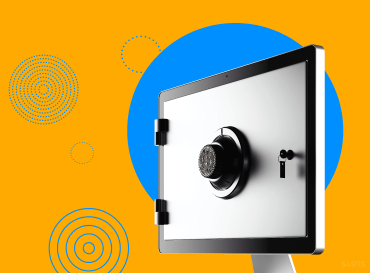Useful "encryption ransomware": Why users need a cryptographer
Monday, April 18, 2022
In the reality of the digital age, with its various threats, having an anti-virus is not just good manners, but also an urgent need. So, if an anti-virus is protecting your system, we're proud of you! If not, it is never too late to install one. However, an anti-virus is only a basic method for countering cyber challenges and just one of tools that helps ensure digital security. The more loopholes for potential attacks you close, the higher your security level will be. That is why modern information security tools are comprehensive and include anti-spam, firewall, parental control and other equally important components, in addition to an anti-virus. And there also exist tools like cryptographers. In today's issue, we will talk about what they are and what their purpose is.
A cryptographer is a specialised program that uses encryption to ensure the safety and confidentiality of information from outsiders. Such a tool may be needed to protect absolutely any data stored on a PC, laptop, and removable media, and even in cloud services. There are many options. These could be work documents and databases, files with the message history in messengers and email, family photo and video archives, etc.
Someone will argue that setting a password for a Windows account is enough to protect files on a PC. In this case, no one will penetrate it and be able to access the data, right? Unfortunately, no. Such relatively simple protection will be easily bypassed even by cybercriminals who are minimally sophisticated in terms of tech-savviness. And a storage medium itself with valuable data is very easy to steal (and just as easy to lose when it comes to portable devices such as laptops). What if your computer breaks down and you give it to a repair shop? Who can guarantee that it won’t have an unscrupulous employee who’ll be interested in the drive’s contents and want to profit from it somehow? And here, no passwords will help. The same applies to removable media: not every flash drive can now be protected with the same password, but even if it is password-protected, a lost device in the hands of a skillful hacker will actually become an open book. What then could possibly be said about flash drives that have no protection, which are now the majority. If you lose such a flash drive, you can say goodbye to it: your files will be available to anyone.
However, if you encrypt important data with the help of a cryptographer, the removable media will be a useless "brick" in criminal hands. Its protected content will simply not be accessible without a special code. And thanks to strong algorithms used in encryption, decryption can take years.
The cryptographer is available to Russian users as part of the comprehensive product Dr.Web Security Space + Cryptographer for Windows. We will not go deep into the details of its work and will note only its main features. It helps protect both individual files and entire drives. In the first case, certain kinds of containers are created in the system (they are called crypto containers) that look like independent logical drives in the operating system. Such containers can be stored on separate media or in cloud services, transferred between different computers, and connected as needed.
In the second case, encrypted drive partitions (they are called crypto drives) are created, for which the entire file system is encrypted. Crypto drives can also be transferred to other computers and uploaded to the cloud. You can create a fully encrypted system drive as well as protected removable media—for example, USB flash drives.
Another important feature of the cryptographer is the reliable deletion of data. It will be useful, for example, in the case of a computer’s decommission or a storage medium after a breakdown, or when selling equipment. It is not enough just to remove data from the disk or format it because there are specialised ways to recover it. Therefore, it is very important to wipe information correctly, with no possibility of recovering it.
The Anti-virus Times recommends
- Encrypt your most important and valuable data.
- If you upload data (such as backups) to the cloud, you should also encrypt them.
- Destroy information on drives and other media before selling or decommissioning them.
#security #backup #data_loss_prevention #cryptography #removable_devices #removable_media



![Shared 0 times [Twitter]](http://st.drweb.com/static/new-www/social/no_radius/twitter.png)
Tell us what you think
To leave a comment, you need to log in under your Doctor Web site account. If you don't have an account yet, you can create one.